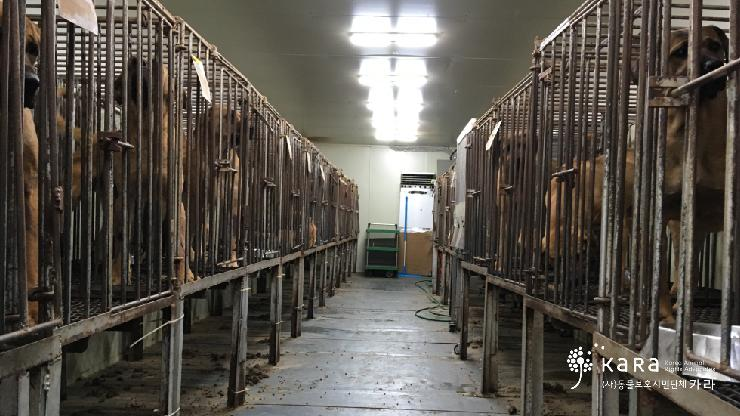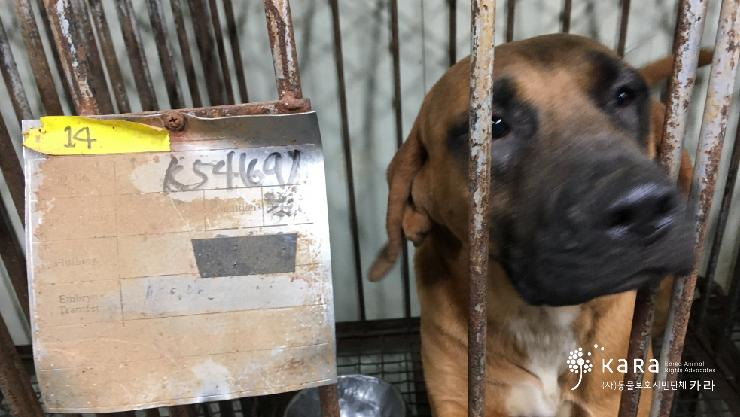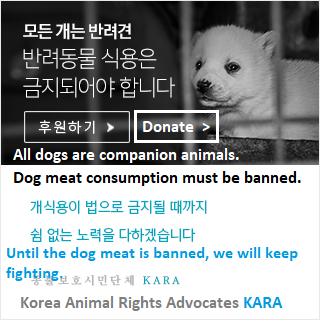[Press Conference] Seoul National University’s Dark Connection with Dog Meat Farms – We Demand the Truth from SNU!
Below is translation of Korea Animal Rights Advocates (KARA)’s post on December 19, 2017:
Claiming to breed special-purpose dogs, Seoul National University (SNU) has formed a dark connection with dog meat farms. We demand the truth from SNU!
Korea Animal Rights Advocates (KARA) revealed today the results of its investigation into Seoul National University (SNU)’s long-standing secret: Beneath the façade of press releases and scientific journal articles with snazzy titles such as “World’s First Dog Clone,” “Wolf Cloning,” and “Commercialization of Dog Cloning,” there has been unethical animal abuse, unscientific laboratory animal mistreatment and exploitation, and breach of ethics in animal research. The animal abuse in the SNU’s College of Veterinary Medicine’s dog cloning program, conducted using dogs from dog meat farms, is not only a violation of the ethical code of research which must be adhered to by scientists, but also common sense moral consensus; these suspicions, therefore, must be investigated and rectified. The allegations against SNU were supported by the testimony of a public interest informant who worked in the lab for four months as the animals manager.
Seoul National University’s Animal Research Ethics Committee failed to control the import of dogs from dog meat farms for experimentation
In November of 2017, a truck was seen delivering young Tosa dogs to the SNU College of Veterinary Medicine research laboratory 85-1 dong. The Beagle Rescue Network later confirmed that the dogs were brought in from a meat dog farm. KARA had previously conducted an investigation into Dr. Byeong-Chun Lee’s cloning research project at SNU, which used dogs from dog meat farms. They sent an open-ended questionnaire to SNU and its veterinary college, requesting details of the source of the dogs used in the cloning experiments as well as how the dogs were treated and disposed of once the studies were concluded. However, SNU has not only neglected to respond to our request sent over a month ago, but has brought in more dogs from dog meat farms. This is a clear depiction of SNU’s domineering, disdainful, and immoral attitude towards animal protection groups and society.
[Attachment 1_11.15 Contents of the open-ended questionnaire sent by KARA to Seoul National University]
SNU’s questionable ethics and morals stems from the fact that its Institutional Animal Care and Uses Committee (IACUC), the group in charge of overseeing compliance with ethical standards in animal experiments, is barely in operation. SNU published its ethics charter for faculty and guidelines for ethical research, and operates a total of 5 research ethics committees including the Research Integrity Committee, the Bioethics Review Committee, the Animal Research Ethics Committee, and the Biological safety Committee. The Animal Research Ethics Committee, which has the most direct connection to this incident, is led by Dr. Jae-Hak Park of the College of Veterinary Medicine; he is also the chairperson for the National Animal Welfare Committee. The prime suspect in this particular incident, Dr. Byeong-Chun Lee, is the director of SNU’s laboratory animal facility as well as the director overseeing the Laboratory Animal Resource Management Center.
[Attachment 2_Research Ethics Organization of Seoul National University]
Through our investigation, KARA found the vehicle used to deliver the young Tosa dogs to SNU labs at a dog meat farm in Chungcheongnam-do province. This particular dog farm, which raises more than 850 dogs in a cramped and filthy environment, is a typical dog meat farm; in 2016 it was even fined for violation of management standards. The farm’s owner (or family) also operates a boshintang (dog meat soup) restaurant called “Mak OOO House” nearby, and sells dog meat soup as the primary item on their menu. Transporting dogs from the dog meat farm to the laboratory was only the tip of this iceberg.
The Dark Connection Between Seoul National University College of Veterinary Medicine’s Dog Cloning Research Project and a Dog Meat Farm.
[Attachment 3_Testimony of an Informant Regarding Animal Abuse That Occurred in SNU College of Veterinary Medicine’s Dog Cloning Lab]
Research Results that do not adhere to the Research Ethics cannot be acknowledged; A Review of All Published Papers is Necessary
Nevertheless, for a long period of time, SNU and the SNU Animal Research Ethics Committee merely acquiesced to the publishing of a dissertation of the research results obtained by using dogs raised in meat dog farms, the worst kind that operate dog meat restaurants where not only it fails to meet standard of welfare for laboratory animals but the very basic level of care is impossible. They returned the dogs to the dog farm after they’ve been used in the laboratory. It is clear that they didn’t believe it was a problem for scientific papers to be published with the results from such acts. Furthermore, demands for corrective action were met with useless responses such as the cages were the only things that needed to be changed. Even after the issue surfaced, SNU denied responsibility by claiming that Dr. Byeong-Chun Lee would personally be held accountable. It is enough to question whether SNU’s prestige is simply a fad and whether the Animal Experimental Ethics Committee is just for show.
While the Animal Research Ethics Committee was neglecting its responsibility, the dog cloning research at SNU continued, and so did the animal abuse. In 2005, researchers announced that they successfully cloned 2 dogs from 1,095 fertilized eggs. One of the puppies died after 20 days; with the survival of the remaining puppy named Snuppy the success rate was only 0.09%. The SNU research team later claimed they wanted to restore endangered wolves and used an additional 251 fertilized eggs for cloning, to produce Snurf and Snurfy.
Even if we were to accept the SNU research team’s assertion about their success rate, at least 1,346 fertilized eggs were needed for just two cloning experiments. For eggs needed for the research, as well as for surrogacy necessary for cloning, several thousand dogs were sold at ridiculously low prices and subjected to this cruel research project. (*Note: 1 beagle from a laboratory animal supplier costs 10 million won [verified in an interview between Animal People and Kwang-Hee Lee, a researcher at the Animal Quarantine Division]; dogs from dog meat farms cost only 200,000 won.)
Dr. Byeong-Chun Lee claimed that, based on the number of surrogate mother animals used, the Snuppy and wolf cloning projects have a success rate of 1.6% and 16.7% respectively (‘Wolf Cloning Project’ Suspected of Inflating Success Rates…Statistical Distortion for ‘Snuppy Project,’ 2007.4 Kyunghyang Newspaper). The informant witnessed researchers conducting ultrasounds on pregnant surrogate dogs, deemed as failures those dogs with multiple puppies, and sent these pregnant dogs back to the dog meat farm. Along with the inflation of research success rates and with this revelation, the worst of laboratory animal cruelty is exposed. In other words, we cannot rule out the possibility that a surrogate dog from a dog meat farm was in the early stages of pregnancy prior to having the cloned fertilized eggs transplanted, or that she was dropped from the study due to failed cloning experiments. Whatever the reason for the multiple fetuses, surrogate dogs were sent back to the dog meat farm pregnant with cloned fetuses as a result of the cloning experiment. If this is true, the experiments cannot be considered research; they can only be considered extreme animal cruelty. Therefore, it should be investigated whether or not the pregnant surrogate mothers were dropped from the experiment and the grounds for such action as well as whether the same thing happened at the time of the above two studies. Furthermore, if the reported success and efficiency rates of the dog cloning are based on the distorted experiments, they must be corrected immediately.
The Relationship Between the Government’s “Special Purpose Dog Cloning Project,” Dog Meat Farms, and Seoul National University’s Dog Cloning Research
One of the biggest problems around this issue is that the South Korean government, and society in general, by their collective apathy and indifferent attitude, have supported or accepted the acts of cruelty by the researchers on SNU’s dog cloning project. In 2012, the Rural Development Administration and the National Institute of Animal Science received the technology for dog cloning from SNU and started working on the ‘Government Special Purpose Dog Cloning and Distribution Project 3.0.’ In March 2017, they supplied 50 of these dogs cloned from Neo, the famed drug detection dog, to Korea Customs Service. The government argued that the cloned dogs were superior to other dogs due to their higher pass rates on tests and therefore costs were reduced. They also publicly stated that the advantage to producing cloned dogs is that ‘it is easy to obtain the eggs and surrogates we need to clone dogs.’
[Attachment 4_ A few of the promotional material for the special-purpose dog cloning project by the Rural Development Administration and the National Institute of Animal Science]
If the government that has consistently been ignoring the pleas and requests of animal welfare groups and citizens alike to stop the cruelty of the dog meat farms, has in fact been leading the exploitation and inappropriate usage of dogs by partaking in this unscientific and unethical research on dogs from dog meat farms at a bargain price, then their behavior is truly shameless.
Only South Korea Produces “Special Purpose Dogs” Via Cruelty-Based Cloning Experiments
The special purpose dogs currently active in South Korea were imported at a high price from developed countries that have a high level of animal welfare and use the positive reinforcement training method that creates a strong bond between trainer and dog. On the other hand, Neo, the legendary drug detection dog who helped detect 68 cases of illegal drug trafficking and was cloned in March 2017, was born naturally in 2001 through the customs agency’s own breeding program and trained and placed for duty. In other countries first-class therapy dogs, search and rescue dogs, and drug detection dogs are never simply mass-produced by cloning.
Recently, KARA received a suggestion that we should take the dogs rescued from dog meat farms to the UK to train them as therapy dogs or cancer detection dogs, thereby breaking the stereotype against the so-called “meat dogs.” A British expert on the project stated, “Korean dog meat farms are scenes of extreme animal cruelty and I was very traumatized. If the dog is people-friendly, young, and has a healthy appetite, she can absolutely be trained to become a working dog using positive reinforcement training.” In the UK, dogs that receive such training can be successfully integrated into families, giving them a chance to become protective, faithful and loyal companions.
Production of Special-Purpose Dog Clones is Undesirable and Ineffective in the Long Run
Researchers of producing dog clones often argue the following points: Cloning dogs will prevent the grieving of people whose beloved dogs have passed away; dogs who display excellence in skills such as drug detection and search and rescue can be cloned to easily facilitate their roles as working dogs; and cloned dogs can be used as human disease models.
However, the relationships between humans and dogs are not formed at the genetic level, but via individuals, families, or societies. When a beloved dog passes away, we often find similar characteristics in other dogs at animal shelters, strays on the road, or even in a neighbor’s dog tied up in the yard. Moreover, the most important factor in the ability of working dogs is the quality of the relationship and the level of trust based on positive interaction between the dog and the handler. Even if certain genetic qualities are desired to fill specific roles, careful selective breeding can produce dogs that fulfill such requirements. We were able to import dogs trained in these ways from abroad and provide further training. Lastly, there are arguments that the cloned dogs could be used as human disease models, but as efforts to find alternatives to live-animal research are accelerating worldwide and as animal testing regulations are tightened, we have to wonder if it is reasonable to inflict such cruelty on dogs who provide humans with companionship and emotional support.
It has been constantly brought up that the dog cloning technology in Korea is the result of researchers’ ability to easily obtain surrogate dogs and eggs to replicate dogs. For as long as so-called “dog meat farm” dogs are used and abused for experimentation such as in this case, we will continue to receive such a humiliating reputation.
How do natural biologists evaluate the long-term prospects and scientific evidence of cloning special-purpose dogs? Dr. Yi-Kwon Chang of Ewha Women’s University stated, “Cloning is basically asexual reproduction. In contrast, more than 99% of vertebrates, including mammals, have sexual reproduction; the number of vertebrate species that reproduce asexually is minimal. Nature deliberately favors sexual reproduction over asexual reproduction. There are a number of reasons, but one of the most prominent reasons is that reproducing asexually makes an organism more susceptible to disease. Because the same gene combinations are passed down from offspring to offspring, they can be easily hacked by diseases. Therefore, it is not desirable to produce special-purpose dogs through cloning.” She added, “There is insufficient scientific evidence to support the claim that cloned special purpose dogs are superior to non-cloned dogs.” Even Dr. Hee-Jong Woo, also of SNU College of Veterinary Medicine, stated in the past that even if all ideal conditions were met, the clones’ somatic cells cannot exceed the condition of the donor’s cells at the time of donation. However, through the natural mating process, it is possible to produce an offspring that surpasses its parents, so it is superior to cloning.
KARA’s Demands for Seoul National University regarding the Use of and Cruel Experimentation on Dogs from Dog Meat Farms
Today, KARA, along with the informant for public interest, raised the issue of dogs from dog meat farms being exploited for the purpose of cloning special-purpose dogs at SNU. KARA believes the university or government agency‘s special purpose dog cloning project is definitely not something to be proud of because it is only possible in a country like ours, which is the only country in the world where dog-meat farming in a large-scale operation is possible. It also exemplifies the governmental bureaucratic and financial waste. We question the morality and the necessity of the government’s support and enablement of the entire dog cloning “commercialization research” at SNU over the last 10 years.
The special-purpose dog cloning “business” which has been continued in the name of research and even promoted as a National Project, must be stopped. Moreover, SNU, as a national university, must thoroughly and carefully investigate the propriety and ethics of Dr. Byeong-Chun Lee’s dog cloning research lab in order to restore the honor of its name as one of the nation’s most prestigious universities. Should any evidence of unethical or unscientific experimentation and usage of laboratory animals be found, SNU must act quickly to withdraw any papers that were based on such experiments. In this process, SNU should revise its internal maintenance procedures to reinstate its animal research ethics committee to full performance of its intended function, and take this opportunity to reconstruct the committee by terminating the current members who failed to prevent this situation. Dr. Byeong-Chun Lee must immediately resign from SNU’s Experimental Animal Resources Management Department and Seoul Gwanak-gu District must cease the field trip to the fluorescent transgenic dog program. The SNU College of Veterinary Medicine holds a prominent position in Korean society as a leader in animal welfare and ethical research, and thus must accept responsibility and be proactive in resolving this situation. Finally, we demand the immediate shutdown of SNU’s meat dog research lab as well as the ethical management and responsibility for the dogs used in the experiments. We expect SNU to take the opportunity to display its intellectual and self-purification ability.
Until our demands are met, KARA will collaborate with domestic and foreign animal welfare organizations that want to end animal cruelty at SNU’s College of Veterinary Medicine, as well as with the upcoming Pyeongchang Winter Olympics. We will inform the world of the realities of SNU’s barbaric experimentation on meat dogs and the special-purpose dog cloning project.
- Stop the animal research using “meat dog” farm dogs immediately!
- All members of the Seoul National University’s Animal Experimental Ethics Committee must resign for knowingly approving the usage of animals from unauthorized research animal suppliers!
- Seoul National University must thoroughly investigate the researchers responsible and set up measures to prevent recurrence!
- Seoul National University must fully disclose its history of experimentation on dogs from dog meat farms!
- The Rural Development Administration and the National Institute of Animal Science must disclose information on the unethical reality behind the special-purpose dog cloning project!
December 18, 2017
Korea Animal Rights Advocates (KARA), The Whistle Foundation






































Schifosi
Schifosi bastardi
G
This abuse has to be stopped!
All forms of cruelty to dogs must stop! be it: research experimentation in Labs, or for the purpose of human consumption. Simply, leave the dogs alone!! It’s all really sick and barbaric.